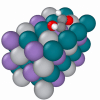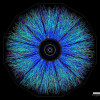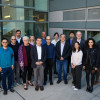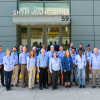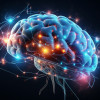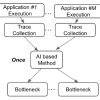News Center
Berkeley Researchers Crack Open ‘AI-at-Scale’ Method for Chemical Science
Berkeley Lab researchers have developed EScAIP, a groundbreaking machine-learning method that accelerates atomistic simulations by improving model scalability. This approach reduces memory usage by more than fivefold and delivers results over ten times faster than current models. Read More »
A Powerful Machine Learning Algorithm that Nudges Gold Atoms Closer Together
At the Relativistic Heavy Ion Collider (RHIC) researchers smash gold atoms at near-light speeds to unlock the Universe’s secrets. A Berkeley Lab-led team developed an AI algorithm to optimize ion beam intensity, boosting collision precision and pushing the boundaries of particle physics for deeper insights into atomic structure and the Universe’s origins. Read More »
University of Tsukuba visit underscores the success of a long-standing partnership
On November 7 and 8, 2024, a group of researchers from the University of Tsukuba (UT) visited Berkeley Lab to learn about new projects in the Computing Sciences Area (CSA). Read More »
Data Science Pioneer Deb Agarwal Named 2024 AGU Fellow
Deb Agarwal’s enduring commitment to creating lasting scientific impact has earned her recognition as a 2024 AGU Fellow, a prestigious honor acknowledging her transformative contributions to Earth and environmental science. She hopes this recognition will help bring greater visibility to the remarkable work of informatics professionals within AGU’s ranks. Read More »
Berkeley Lab AI Science Summit Fuels Collaboration to Tackle Scientific Challenges
Last month, over 100 academics, researchers, industry experts, and national lab staff gathered at Berkeley Lab’s Artificial Intelligence Science Summit (BLASS) to explore AI’s potential to drive scientific discovery. Read More »
Berkeley Lab and Open Compute Project Collaborate to Advance Chiplet Technology for HPC
With the rise of chiplets, AMCR’s John Shalf identified an opportunity for Berkeley Lab to collaborate with hyperscalers—like Amazon, Google, Microsoft, and others—through the Open Compute Project to leverage industry trends for HPC. Read More »
New Sloan grant gives STRUDEL resources to improve tools and expand community
The Alfred P. Sloan Foundation has awarded a $1.125 million grant to a team of researchers at the UC Berkeley Institute for Data Science (BIDS) and Lawrence Berkeley National Laboratory (LBNL). Read More »
John Bell, A Pioneering Mathematician Continues to Shape the Future
In 2024, mathematician John Bell will retire and transition into a new role as a Berkeley Lab affiliate. Read More »
Cybersecurity Center of Excellence Receives Five-year, $6M/Year Award from NSF
Berkeley Lab will serve as the central steward of Trusted CI, the NSF Cybersecurity Center of Excellence. Read More »
Meet Yotam Yaniv, 2024 Berkeley Lab Grace Hopper Fellow
As Berkeley Lab's newest Hopper Postdoctoral Fellow, Yotam Yaniv will focus on developing randomized numerical linear algebra methods. His work aims to create faster, more efficient, and sustainable algorithms that can significantly reduce computational energy consumption, particularly at scale. Read More »
New Computer Simulations Help Scientists Advance Energy-Efficient Microelectronics
FerroX, a new open-source, 3D simulation framework, could advance record-breaking energy efficiency in microelectronics. Read More »
AMCR’s Donatelli Receives 2024 Early Career Award
AMCR Staff Scientist Jeffrey Donatelli has been awarded a 2024 Department of Energy Early Career Research Program award. With this award, he will develop new computational methods for analyzing experimental data. Read More »
Meet Pinchen Xie, 2024 Alvarez Fellow
As Berkeley Lab's newest Alvarez Fellow, Pinchen Xie will be working on expanding the scope of machine learning-assisted multiscale modeling, essentially attempting to describe rare but important atomic behaviors that have not been simulated with the accuracy of quantum mechanics. Read More »
gpCAM Wins R&D100 Award
gpCAM, a software tool for autonomous labs of the future, has been honored with a 2024 R&D 100 Award in the software/services category. Read More »
Science Highlight: Specialized Hardware Helps Researchers Quickly Process Sparse Matrices
Lehigh University and Berkeley Lab researchers have developed an accelerating sparse accumulation (ASA) architecture, specialized hardware that enables faster computation on data sets with many zero values. Read More »
Berkeley Lab Researchers Advance AI-Driven Plant Root Analysis
As part of an investigation to help boost agricultural yields and develop crops that are resilient to climate change, Berkeley Lab scientists developed RhizoNet, a computational tool that harnesses the power of artificial intelligence to transform how we study plant roots and discover new insights into root behavior under various environmental conditions.
Read More »
The Power of Numerical Analysis in Quantum Chemistry
Two Berkeley-based mathematicians, including Dr. Lin Lin of the AMCR division, are using coupled cluster theory to better define the role of finite-size error in materials simulation, underscoring the importance of numerical analysis in science. Read More »
Unraveling Brain Complexity
A SciData collaboration unveils an interpretable AI model and research that sheds light on a captivating discovery: the brain is a dual marvel. It acts as a dynamic system, seamlessly orchestrating our perception, thoughts, and actions, while simultaneously functioning as a high-powered computing engine, deftly processing sensory, cognitive, and behavioral information. Read More »
Celebration Spotlights Phil Colella’s Remarkable DOE Career
On April 19, applied mathematician Phillip Colella’s colleagues, collaborators, mentors, and mentees convened at Berkeley Lab’s Wang Hall to celebrate an illustrious career that has spanned more than four decades. Read More »
Berkeley Lab Dives into HPC’s Future at ISC 2024
From keynote sessions to tutorials, BOFs, and workshops, Berkeley Lab is bringing its HPC expertise to the ISC High Performance 2024 Conference. Read More »
Quantum Insights: Innovating Data Representation, Analysis, and Visualization
Researchers from Berkeley Lab, San Francisco State University, and Case Western Reserve University recently published two papers representing significant strides in understanding and harnessing current quantum devices for data encoding, processing, and visualization. Read More »
David Brown Honored with SIAM Prize for Distinguished Service to the Profession
Berkeley Lab’s David Brown has been honored with a 2024 SIAM Prize for Distinguished Service to the Profession for his decades of commitment to enriching the computational science community. Read More »
AMCR’s Chao Yang Named 2024 SIAM Fellow
Berkeley Lab’s Chao Yang has been named a 2024 SIAM fellow for contributions to the development of novel algorithms and software for eigenvalue problems, as well as applications of algorithms and software to solve challenging scientific problems. Read More »
AI-based Approach Speeds Diagnosis of I/O Performance Bottlenecks in HPC
Data management researchers in Berkeley Lab's Scientific Data Division are using artificial intelligence methods to automatically diagnose I/O performance bottlenecks in HPC applications at the job level. Read More »
US-RSE Works to Bring Research Software Engineers into the Spotlight
To help support software engineers in academia and science, the U.S. Research Software Engineer Association has made it its mission to mount a community-driven effort focused on the increasingly important role of RSEs. Berkeley Lab is getting involved as well.
Read More »









